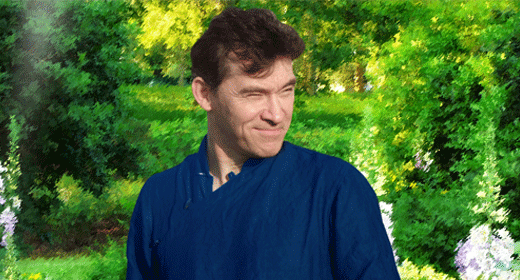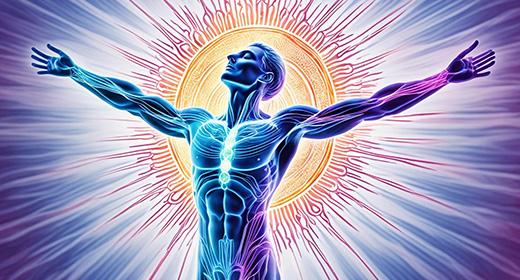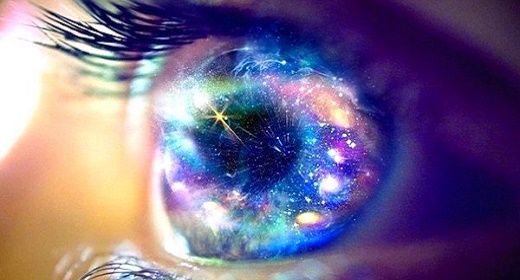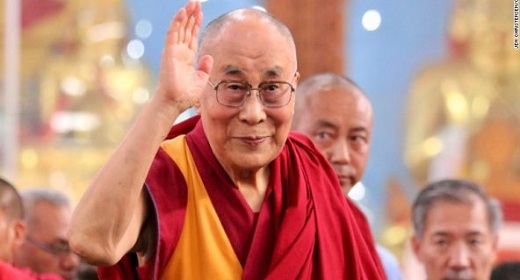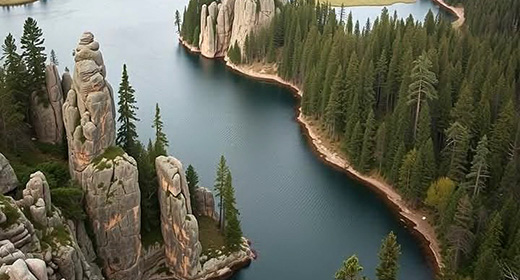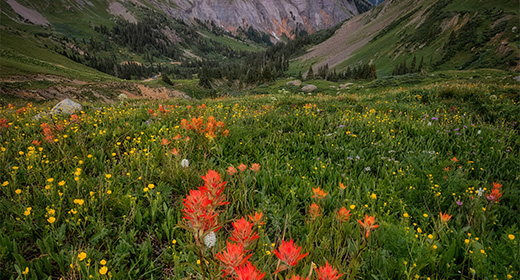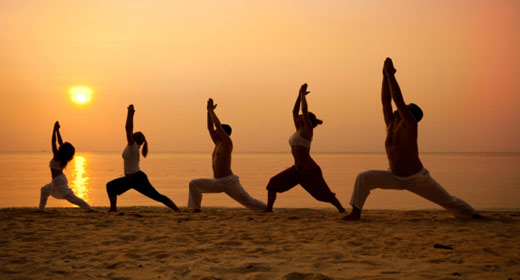Question: How do you view yourself?
Answer: I always consider myself as a simple Buddhist monk. I feel that is the real me. I feel that the Dalai Lama as a temporal ruler is a man-made institution. As long as the people accept the Dalai Lama, they will accept me. But being a monk is something which belongs to me. No one can change that. Deep down inside, I always consider myself a monk, even in my dreams. So naturally I feel myself as more of a religious person.
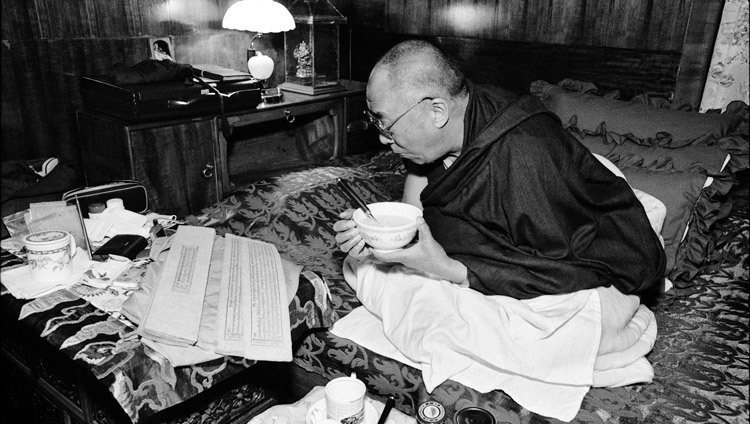
Even in my daily life, I can say that I spend 80% of my time on spiritual activities and 20% on Tibet as a whole. The spiritual or religious life is something I know and have great interest in. I have some kind of confidence in it, and thus I want to study it more. Regarding politics, I have no modern education except for a little experience. It is a big responsibility for someone not so well equipped. This is not voluntary work but something that I feel I must pursue because of the hope and trust that the Tibetan people place on me.
Question: Will you be the last Dalai Lama?
Answer: Whether the institution of the Dalai Lama remains or not depends entirely on the wishes of the Tibetan people. It is for them to decide. I made this clear as early as in 1969. Even in 1963, after four years in exile, we made a draft constitution for a future Tibet which is based on the democratic system. The constitution clearly mentions that the power of the Dalai Lama can be removed by a two-thirds majority vote of the members of the Assembly. At the present moment, the Dalai Lama’s institution is useful to the Tibetan culture and the Tibetan people. Thus, if I were to die today, I think the Tibetan people would choose to have another Dalai Lama. In the future, if the Dalai Lama’s institution is no longer relevant or useful and our present situation changes, then the Dalai Lama’s institution will cease to exist.Personally, I feel the institution of the Dalai Lama has served its purpose. More recently, since 2001 we now have a democratically elected head of our administration, the Kalon Tripa. The Kalon Tripa runs the daily affairs of our administration and is in charge of our political establishment. Half jokingly and half seriously, I state that I am now in semi-retirement.
Question: Do you think you will ever be able to return to Tibet?
Answer: Yes, I remain optimistic that I will be able to return to Tibet. China is in the process of changing. If you compare China today to ten or twenty years ago, there is tremendous change. China is no longer isolated. It is part of the world community. Global interdependence, especially in terms of economics and environment make it impossible for nations to remain isolated. Besides, I am not seeking separation from China. I am committed to my middle-way approach whereby Tibet remains within the People’s Republic of China enjoying a high degree of self-rule or autonomy. I firmly believe that this is of mutual benefit both to the Tibetans as well as to the Chinese. We Tibetans will be able to develop Tibet with China’s assistance, while at the same time preserving our own unique culture, including spirituality, and our delicate environment. By amicably resolving the Tibetan issue, China will be able to contribute to her own unity and stability.
Question: The Chinese have recently stated that the next Dalai Lama will be born in Tibet and chosen by them. What do you have to say about this?
Answer: If the present situation regarding Tibet remains the same, I will be born outside Tibet away from the control of the Chinese authorities. This is logical. The very purpose of a reincarnation is to continue the unfinished work of the previous incarnation. Thus if the Tibetan situation still remains unsolved it is logical I will be born in exile to continue my unfinished work. Of course the Chinese will still choose their own Dalai Lama and we Tibetans will choose our own according to tradition. It will be similar to the present situation of the Panchen Lama. There is a Chinese-appointed Panchen Lama and there is the Panchen Lama chosen by me. One is paraded to serve its master’s purposes and the other is the Panchen Lama accepted in the hearts of all the Tibetans.
Question: What are your commitments?
Answer: In general, I always state that I have three commitments in life. Firstly, on the level of a human being, my first commitment is the promotion of human values such as compassion, forgiveness, tolerance, contentment and self-discipline. All human beings are the same. We all want happiness and do not want suffering. Even people who do not believe in religion recognize the importance of these human values in making their lives happier. I remain committed to talk about the importance of these human values and share them with everyone I meet.
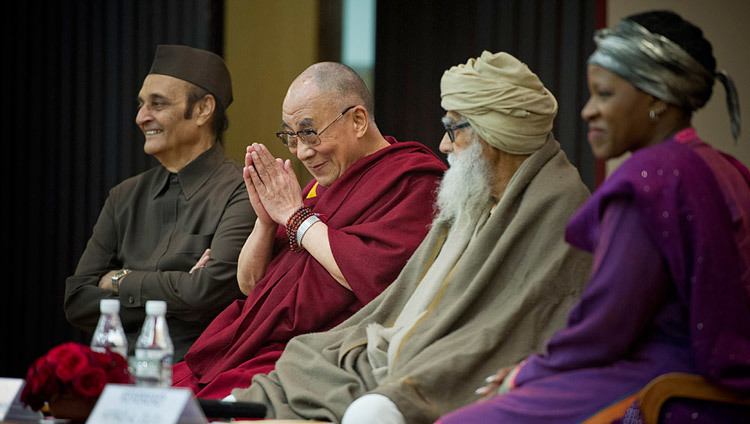
Secondly, on the level of a religious practitioner, my second commitment is the promotion of religious harmony and understanding amongst different religious traditions. Despite philosophical differences, all major world religions have the same potential to create better human beings. It is therefore important for all religious traditions to respect one another and recognize the value of each other’s respective traditions. Thirdly, I am a Tibetan and carry the name of the Dalai Lama. Tibetans place their trust in me. Therefore, my third commitment is to the Tibetan issue. I have a responsibility to act the free spokesperson of the Tibetans in their struggle for justice. As far as this third commitment, it will cease to exist once a mutually beneficial solution is reached between the Tibetans and Chinese. However, my first two commitments I will carry on till my last breath.
Question: What were your first feelings on being recognized as the Dalai Lama? What did you think had happened to you?
Answer: I was very happy. I liked it a lot. Even before I was recognized, I often told my mother that I was going to Lhasa. I used to straddle a window sill in our house pretending that I was riding a horse to Lhasa. I was a very small child at the time, but I remember this clearly. I had a strong desire to go there. Another thing I didn’t mention in my autobiography is that after my birth, a pair of crows came to roost on the roof of our house. They would arrive each morning, stay for while and then leave. This is of particular interest as similar incidents occurred at the birth of the First, Seventh, Eighth and Twelfth Dalai Lamas. After their births, a pair of crows came and remained. In my own case, in the beginning, nobody paid attention to this. Recently, however, perhaps three years ago, I was talking with my mother, and she recalled it. She had noticed them come in the morning; depart after a time, and then the next morning, come again. Now, the evening the after the birth of the First Dalai Lama, bandits broke into the family’s house. The parents ran away and left the child. The next day when they returned and wondered what had happened to their son, they found the baby in a corner of the house. A crow stood before him, protecting him. Later on, when the First Dalai Lama grew up and developed in his spiritual practice, he made direct contact during meditation with the protective deity, Mahakala. At this time, Mahakala said to him, Somebody like you who is upholding the Buddhist teaching needs a protector like me. Right on the day of your birth, I helped you. So we can see, there is definitely a connection between Mahakala, the crows, and the Dalai Lamas.
Another thing that happened, which my mother remembers very clearly, is that soon after I arrived in Lhasa, I said that my teeth were in a box in a certain house in the Norbulinka. When they opened the box, they found a set of dentures which had belonged to the Thirteenth Dalai Lama. I pointed to the box, and said that my teeth were in there, but right now I don’t recall this at all. The new memories associated with this body are stronger. The past has become smaller, vaguer. Unless I made a specific attempt to develop such a memory, I don’t recall it.
Question: Do you remember your birth or the womb state before?
Answer: At this moment, I don’t remember. Also, I can’t recall if at that time when I was a small child, I could remember it. However, there was one slight external sign perhaps. Children are usually born with their eyes closed. I was born with my eyes open. This may be some slight indication of a clear state of mind in the womb.
Question: Between the ages of sixteen and eighteen, after you assumed temporal power, did you change?
Answer: Yes, I changed a little bit. I underwent a lot of happiness and pain. Within that and from growing, gaining more experience, from the problems that arose and the suffering, I changed. The ultimate result is the man you see now (laughter).
Question: How about when you just entered adolescence? Many people have a difficult time defining themselves as an adult. Did this happen to you?
Answer: No. My life was very much in a routine. Two times a day I studied. Each time I studied for an hour, and then spent the rest of the time playing (laughter). Then at the age of 13, I began studying philosophy, definitions, debate. My study increased, and I also studied calligraphy. It was all in a routine though, and I got used to it. Sometimes, there were vacations. These were very comfortable and happy. Losang Samten, my immediate elder brother, was usually at school, but during these times he would come to visit. Also, my mother would come occasionally and bring special bread from our province of Amdo. Very thick and delicious. She made herself.
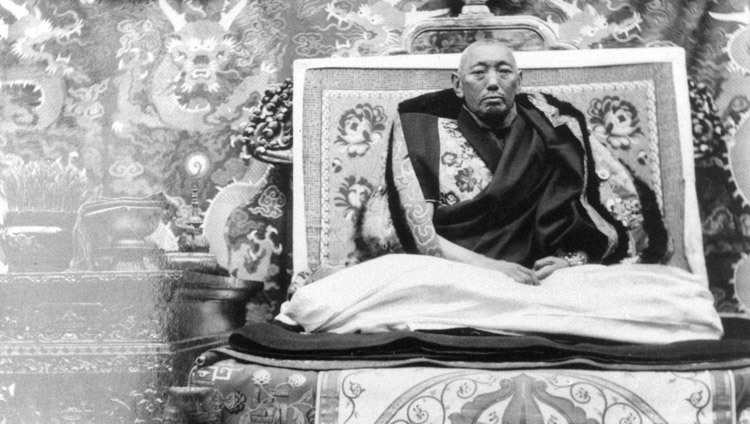
Question: Are there any of your predecessors in whom you have a special interest or with whom you have a particular affinity?
Answer: The Thirteenth Dalai Lama. He brought a lot of improvement to the standards of study in the monastic colleges. He gave great encouragement to the real scholars. He made it impossible for people to go up in the religious hierarchy, becoming an abbot and so forth, without being totally qualified. He was very strict in this respect. He also gave tens of thousands of monks’ ordinations. There were his two main religious achievements. He didn’t give many initiations, or many lectures. Now, with respect to the country, he had great thought and consideration for statecraft. The outlying districts in particular. How they should be governed and so forth. He cared very much how to run the government more efficiently. He had great concern about our borders and that type of thing.
Question: During the course of your life, what have been your greatest personal lessons or internal challenges? Which realizations and experiences have had the most effect on your growth as an individual?
Answer: Regarding religious experience, some understanding of shunya (emptiness: lack of independent self nature) some feeling, some experience and mostly bodhichitta, altruism. It has helped a lot. In some ways, you could say that it has made me into a new person, a new man. I am still progressing. Trying. It gives you inner strength, courage, and it is easier to accept situations. That’s one of the greatest experiences.
Question: When you became a refugee, what helped you gain this strength? Was it the loss of your position and country, the fact of everyone suffering around you. Were you called on to lead your people in a different way than you had been accustomed to?
Answer: Being a refugee is really a desperate, dangerous situation. At that time, everyone deals with reality. It is not the time to pretend things are beautiful. That’s something. You feel involved with reality. In peace time, everything goes smoothly. Even if there is a problem, people pretend that things are good. During a dangerous period, when there’s a dramatic change, then there’s no scope to pretend that everything is fine. You must accept that bad is bad. Now when I left the Norbulinka, there was danger. We were passing very near the Chinese military barracks. It was just on the other side of the river, the Chinese check post there. You see, we had definite information two or three weeks before I left, that the Chinese were fully prepared to attack us. It was only a question of the day and hour.
Question: About you being the incarnation of the bodhisattva of infinite compassion, Avalokiteshvara. How do you personally feel about this? Is it something you have an unequivocal view of one way or another?
Answer: It is difficult for me to say definitely. Unless I am engaged in a meditative effort, such as following my life back, breath by breath, I couldn’t say exactly. We believe that there are four types of rebirth. One is the common type wherein, a being is helpless to determine his or her rebirth, but only reincarnates in dependence on the nature of past actions. The opposite is that of an entirely enlightened Buddha, who simply manifests a physical form to help others. In this case, it is clear that the person is Buddha. A third is one who, due to past spiritual attainment, can choose, or at least influence, the place and situation of rebirth. The fourth is called a blessed manifestation. In this the person is blessed beyond his normal capacity to perform helpful functions, such as teaching religion. For this last type of birth, the person’s wishes in previous lives to help others must have been very strong. They obtain such empowerment. Though some seem more likely than others, I cannot definitely say which I am.
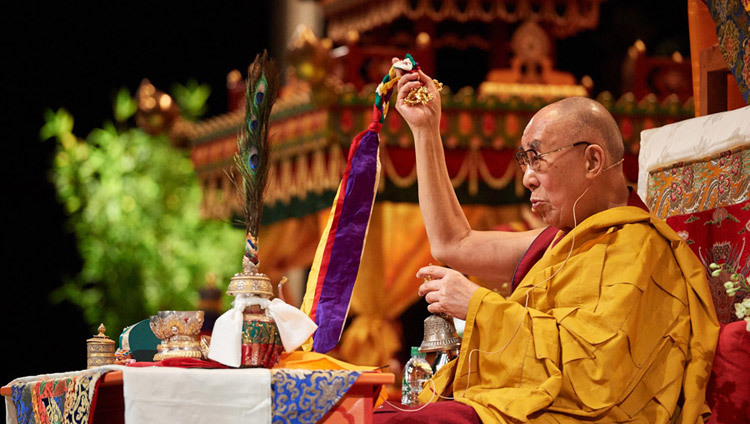
Question (follow up): From the viewpoint then of the realistic role you play as Chenrezi, how do you feel about it? Only a few people have been considered, in one way or another, divine. Is the role a burden or a delight?
Answer: It is very helpful. Through this role I can be of great benefit to people. For this reason I like it: I’m at home with it. It’s clear that it is very helpful to people, and that I have the karmic relationship to be in this role. Also, it is clear that there is a karmic relationship with the Tibetan people in particular. Now you see, you may consider that under the circumstances, I am very lucky. However, behind the word luck, there are actual causes or reasons. There is the karmic force of my ability to assume this role as well as the force of my wish to do so. In regard to this, there is a statement in the great Shantideva’s Engaging in the Bodhisattva Deeds which says, As long as space exists, and as long as there are migrators in cyclic existence, may I remain removing their sufferings. I have that wish in this lifetime, and I know I had that wish in past lifetimes.
Question (follow up): With such a vast goal as your motivation, how do you deal with your personal limitations, your limits as a man?
Answer: Again, as it says in Shantideva, If the blessed Buddha cannot please all sentient beings, then how could I. Even an enlightened being, with limitless knowledge and power and the wish to save all others from suffering, cannot eliminate the individual karma of each being.
Question (follow up): Is this what keeps you from being overwhelmed when you see the suffering of the six million Tibetans, who on one level, you are responsible for?
Answer: My motivation is directed towards all sentient beings. There is no question, though, that on a second level, I am directed towards helping Tibetan. If a problem is fixable, if a situation is such that you can do something about it, then there is no need to worry. If it’s not fixable, then there is no help in worrying. There is no benefit in worrying whatsoever.
Question (follow up): A lot of people say this, but few really live by it. Did you always feel this way, or did you have to learn it?
Answer: It is developed from inner practice. From a broader perspective, there will always be suffering. On one level, you are bound to meet with the effects of the unfavorable actions you yourself have previously committed in body, speech or mind. Then also, your very own nature is that of suffering. There’s not just one factor figuring into my attitude, but many different ones. From the point of view of the actual entity producing the suffering, as I have said, if it is fixable, then there is no need to worry. If not, there is no benefit to worrying. From the point of view of the cause, suffering is based on past unfavorable actions accumulated by oneself and no other. These karmas are not wasted. They will bear their fruit. One will not meet with the effects of actions that one has not done oneself. Finally, from the viewpoint of the nature of suffering itself, the aggregates of the mind and body have as their actual nature, suffering. They serve as a basis for suffering. As long as you have them you are susceptible to suffering. From a deep point of view, while we don’t have our independence and are living in someone else’s country, we have a certain type of suffering, but when we return to Tibet and gain our independence, then there will be other types of suffering. So, this is just the way it is. You might think that I’m pessimistic, but I am not. This is how, through Buddhist teaching and advice, we handle situations. When fifty thousand people in the Shakya clan were killed one day, Shakyamuni Buddha, their clansman, didn’t suffer at all. He was leaning against a tree, and he was saying, I am a little sad today because fifty thousand of my clansmen were killed. But he, himself, remained unaffected. Like that, you see (laughter). This was the cause and effect of their own karma. There was nothing he could do about it. These sorts of thoughts make me stronger; more active. It is not at all a case of losing one’s strength of mind or will in the face of the pervasive nature of suffering.

